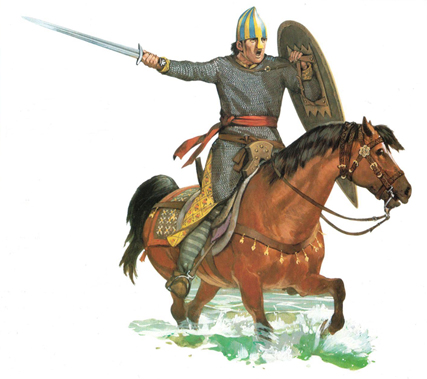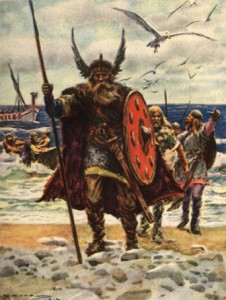 Listener Steve asked “What do you think would have happened had Harold defeated William at Hastings?”
Listener Steve asked “What do you think would have happened had Harold defeated William at Hastings?”
It’s always dangerous to start talking about how history would have been different if a certain key moment had gone differently, but it’s fun to speculate. Harold would undoubtedly have emerged from Hastings with quite a formidable reputation, having held off two full-scale invasions and an earlier series of raids by the Welsh. (King Alfred the Great- the only British sovereign to earn that title- had only managed to keep half his kingdom intact). Normandy, by contrast would have been chaotic- assuming William didn’t survive the battle. It’s amusing to wonder if a strong Harold would have returned the favor and intervened, but the Anglo-Saxons were never as offensively minded as the Normans. It’s also unlikely that they would have invaded either Scotland or Ireland as the Normans did, perhaps at most settling for some sort of ‘over-king’ recognition by the various Scottish clans. That being the case there would be no ‘Act of Union’, no Great Britain and of course no British Empire. England, in fact, would probably have remained part of the northern sphere much like Iceland or Norway. It did have established trading links with the Franks and Low Countries, but both culturally and linguistically it would have been more drawn to the Scandinavian orbit.
Another obvious change would be a linguistic one; the English language as we know it wouldn’t exist (about 60% is Latin or French based) and would be much closer to German . Pre-Conquest England was also generally less efficient and more “democratic” as the King was technically elected by the Witan. William greatly strengthened the monarchy and introduced both feudalism and the distinctive castles that still dot the countryside. Given that the Norman kings were so firmly above the law, democracy may have emerged more quickly under Harold’s descendants- although that’s certainly highly debatable.
Finally, without the Norman Conquest, the English king would not have had a claim to the French throne and would presumably have avoided the hundred year’s war. Without that great unifying struggle the French monarchy would have been weakened and may not have become a centralized state as quickly. While probably not sharing Germany’s fate, France would certainly not have been the power it became by the 17th century.
One could go on and on like this, but the farther we get from the event, the less credible it is. In Harold’s lifetime at least, the people of England would have been much happier if he had triumphed at Hastings.
 Listener William asked what a Norman army looked like and what tactics it employed.
Listener William asked what a Norman army looked like and what tactics it employed.
By today’s standards the Normans usually fielded small armies. Roger de Hauteville crossed over to Sicily to begin his grand invasion with only 270 knights and managed to take Messina and Palermo with less than 500. Over the next thirty years his army probably never exceeded 700 knights but was able to defeat Saracen armies more than 15 times its size. When the Normans were threatened, however, they could turn out larger forces. There were 3,000 knights and as many infantry present at Civitate and William the Conqueror’s army was most likely around 7,000 strong. (I should mention that troop numbers are notoriously difficult to work out- medieval authors loved to inflate their figures)
The standard force was composed of two basic parts- lightly armed foot soldiers and heavy cavalry. For the most part the infantry wore a mail hauberk and carried a lance or spear, while the knights had the addition of a sword. This was the knight’s most treasured weapon and the symbol of his rank. Unlike the lance which was frequently lost or broken in battle, the sword was more durable and was usually handed down from generation to generation. It was often given a personal name and sometimes had religious inscriptions etched into the blade. In addition to these, some Norman knights carried the massive axes of their Viking ancestors (hideous weapons that could lop off limbs with a single stroke) and the Bayeux Tapestry clearly depicts mounted warriors making use of the bow- though no Norman examples have survived.
These arms and armor were not substantially different than other armies of the time, but it was in strategy that the Normans really excelled. They were extremely organized and disciplined- unlike many of their opponents- and capable of pulling off complex maneuvers. Their cavalry operated in groups of 25 to 50 men known as conrois which could act independently or be combined into larger bands. They were mobile killing machines and their charge was virtually unstoppable, but in the rare case when the cavalry assault proved ineffective (as at Hastings) they could also show a remarkable tactical flexibility. In the case of Hastings they executed a series of feigned retreats that lured the English off their hill and then wheeled around to butcher them in small groups. When necessary the knights would also dismount and fight as infantry or form a wedge that could break through even the most determined defenses. Perhaps the main Norman attribute in battle, however, was a willingness to adapt. The Great Count Roger effectively used sea transports to move his men around despite a complete unfamiliarity with ships and Robert Guiscard adopted Byzantine tactics to combat emperor Alexius Comnenus. Within a generation of conquering southern Italy and Sicily Roger II commanded an army composed of Saracen infantry, Greek generals, and Norman cavalry that was one of the most powerful in Christendom.
In the end much of their success came down to two factors- charismatic leaders and a fair amount of luck. They were gifted with a series of brilliant tacticians and dominating personalities- William the Conqueror, Robert Guiscard, Roger de Hauteville and Roger II among others- who fully embraced Pliny’s famous maxim “Fortune favors the bold!”
 Listener Eric asked if there was any truth to the medieval rumor that the legendary Hrolfr Granger- a man so enormous that no horse could support his weight- was actually Rollo of Normandy.
Listener Eric asked if there was any truth to the medieval rumor that the legendary Hrolfr Granger- a man so enormous that no horse could support his weight- was actually Rollo of Normandy.
Believe it or not this was a question of such fierce debate in the early 20th century that it spilled into national newspapers and became the subject of several angry diatribes. 1911 was the 1,000th year anniversary of the founding of Normandy and there was much Scandinavian pride in this native son made good. The trouble was that no one was exactly sure where Rollo came from and both Denmark and Norway claimed him. Norway especially was proud of its distinct national character (they had just broken away from Sweden in 1905) and wasn’t about to let Denmark steal their thunder.
What made the argument particularly fierce is that there is so little reliable information about Rollo’s origins. The earliest source (Richer of Reims- circa 996) gives Rollo a Danish origin, but he makes no distinction between any Vikings, referring to all of them as Danes. Where exactly each roving band of raiders originated was not that important to those who had to fend them off. The Norse sagas on the other hand (circa 12th century) all claim that Rollo (whom they call Hrolfr Granger) was from Norway as does the French Chronicon de gestis Normannorum and the Welsh Historia Gruffud vab Kenan. The Normans themselves were split on the subject. Dudo of St. Quentin (1030) gave Rollo a Danish father while Geoffrey Malaterra (1090) gave him a Norwegian one.
The truth unfortunately is that we will probably never have conclusive proof either way. I tend to think that the Norse account of Hrolfr Granger contains a healthy dose of legend but that it can loosely be connected to Rollo. The medieval sources, when they bothered to distinguish between different groups of Vikings, usually came down on the side of a Norwegian ancestry. Hardly an airtight case, but most likely the best we can do.
 Listener Bruce from Ohio asked about the background of the Normans. Can they really be considered Vikings? The answer- as is so often the case with history- is yes and no. The Normans were indeed descended from Scandinavian stock and the term ‘Norman’ comes from ‘northmen’ which was the French term for the Vikings. Rollo the first “Duke” led a collection of Norwegian and Danish raiders who forced the Frankish king Charles the Simple to grant them land. These Vikings, however, were always a minority in Normandy, surrounded and vastly outnumbered by the French population. Rollo, who knew he had to adapt to survive, set the tone by taking a Frankish wife, adopting the French language and religion, and encouraging his men to do likewise. Within a generation Norse names died out, and the Dukes were busy trying to prove that they were respectable members of the Frankish power structure. They maintained close ties with their Scandinavian cousins- even agreeing to sell Viking plunder in their markets- but made it a point to distinguish themselves from the ‘sea wolves’.
Listener Bruce from Ohio asked about the background of the Normans. Can they really be considered Vikings? The answer- as is so often the case with history- is yes and no. The Normans were indeed descended from Scandinavian stock and the term ‘Norman’ comes from ‘northmen’ which was the French term for the Vikings. Rollo the first “Duke” led a collection of Norwegian and Danish raiders who forced the Frankish king Charles the Simple to grant them land. These Vikings, however, were always a minority in Normandy, surrounded and vastly outnumbered by the French population. Rollo, who knew he had to adapt to survive, set the tone by taking a Frankish wife, adopting the French language and religion, and encouraging his men to do likewise. Within a generation Norse names died out, and the Dukes were busy trying to prove that they were respectable members of the Frankish power structure. They maintained close ties with their Scandinavian cousins- even agreeing to sell Viking plunder in their markets- but made it a point to distinguish themselves from the ‘sea wolves’.
So what exactly were they? As frustrating as it is we have to fall back on how they saw themselves. Their court historians never tired of pointing it out. They were not Vikings or French but something far better. They were Normans.
 Listener Steve asked “What do you think would have happened had Harold defeated William at Hastings?”
Listener Steve asked “What do you think would have happened had Harold defeated William at Hastings?”

